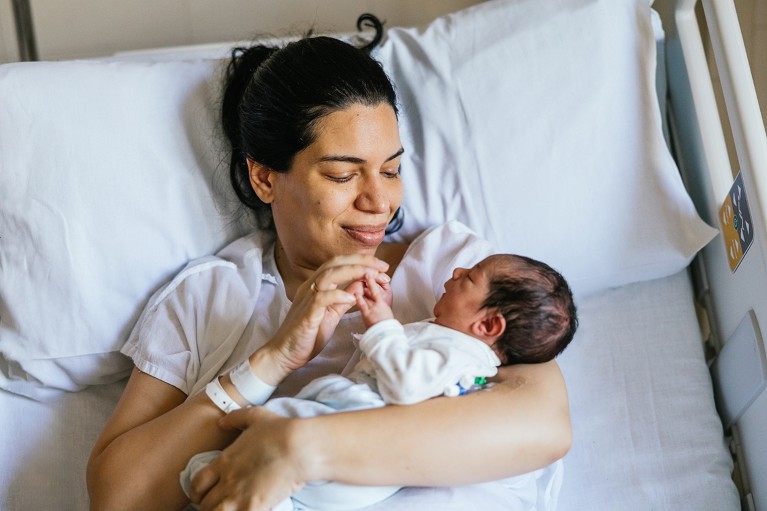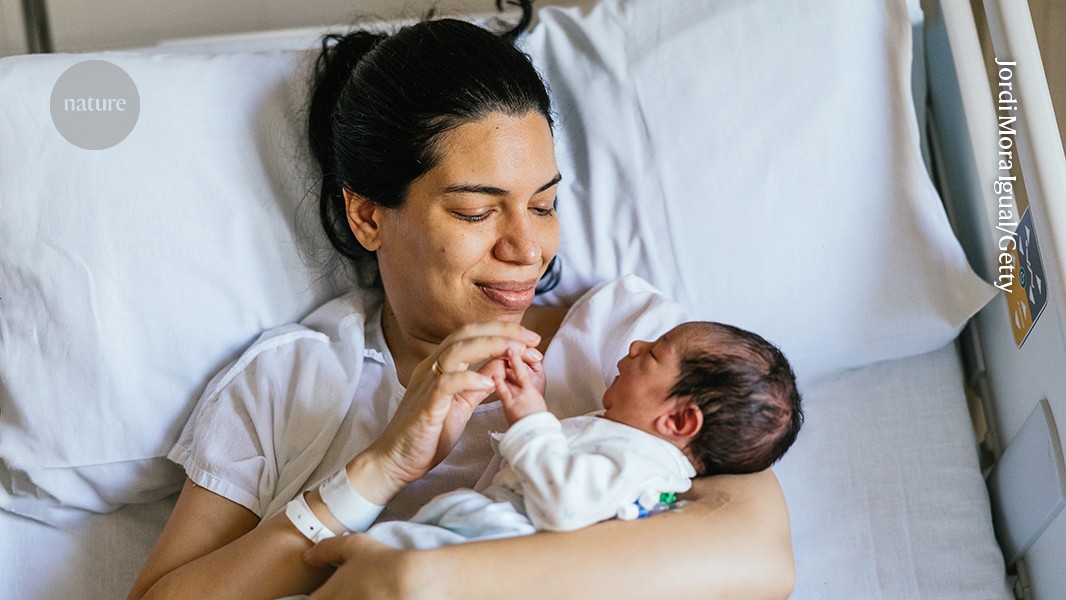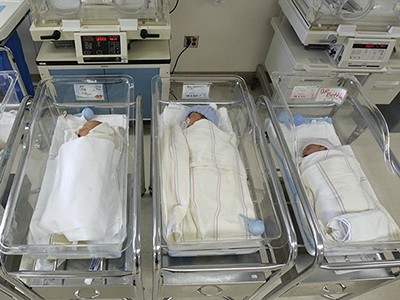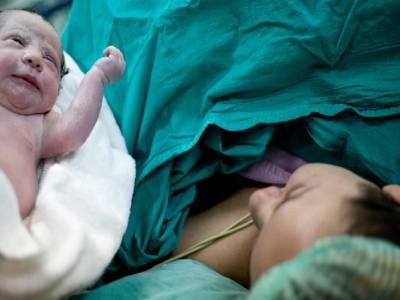
The route of birth — c-section or vaginal — can have an effect on an infant’s microbiome.Credit: Jordi Mora Igual/Getty
Feeding a baby born by caesarean section milk containing a tiny bit of their mother’s poo introduces beneficial microbes to their gut, according to a clinical trial. The approach might one day help to prevent diseases during childhood and later in life.
The study — which reported early results last week during IDWeek, a meeting of infectious-disease specialists and epidemiologists in Los Angeles, California — is the first randomized controlled trial to test the ‘poo milkshake’ concept.
The preliminary findings confirm researchers’ hypothesis that a small faecal-matter transplant is enough to have a positive effect on the infant’s microbiome, says Otto Helve, director of the public-health department at the Finnish Institute for Health and Welfare in Helsinki, Finland, and the study’s primary investigator.
Inherited microbes
Some studies show that babies born by c-section, rather than vaginal birth, have a higher risk of asthma, inflammation of the digestive system and other diseases associated with a dysfunctional immune system1. Scientists think that these differences arise because babies born by c-section aren’t exposed to and rapidly colonized by the microbes in their mothers’ vaginas and guts. Studies have even shown that c-section babies are more vulnerable to pathogens in hospitals than are babies born by vaginal birth2.
Do C-section babies need mum’s microbes? Trials tackle controversial idea
Experiments have attempted to compensate for that by swabbing babies born by c-section with microbes from their mother’s vagina or giving them these microbes orally, a practice known as ‘vaginal seeding’. But this technique has had limited success, because vaginal microbes, scientists have learnt, cannot effectively colonize infants’ guts, says Yan Shao, a microbiome scientist at the Wellcome Sanger Institute in Hinxton, UK.
Helve and his colleagues have been pioneers in testing whether faecal transplants can instead improve the health of a baby’s microbiome. In their latest trial, which recruited women scheduled for a c-section at the Helsinki University Hospital, the researchers mixed a fluid containing 3.5 milligrams of a mother’s poo into milk and gave the concoction to the corresponding baby. They did this for 15 babies during their first feed. Another 16 babies received a placebo.
An analysis of the babies’ poo samples showed that the two groups had similar microbial diversity at birth, but from their second day of life, there is a marked difference between the two groups, which persisted until 6 months of age, around when babies start eating solid food.
C-section babies are missing key microbes
The trial, which will monitor the babies during their first two years, is ongoing, but the early data align with what was seen in a small pilot study3 without a placebo group published by the same team in 2020. The researchers studied seven babies and found that the microbiomes of those that received a maternal faecal transplant developed similarly to those of babies born by vaginal delivery.
Given the success of the pilot study, “it isn’t surprising that maternal faecal microbiota transplantation would make a difference to the c-section infant microbiota” in the latest trial, Shao says. He notes that, although the trial is an important clinical study, it doesn’t directly compare the microbiome of treated c-section babies with that of infants delivered vaginally — which would be needed to demonstrate that the technique effectively restores microbiomes affected by c-section.
‘Don’t try this at home’
The researchers emphasize that no one should try this approach at home. Trial participants went through extensive screening. “You have to be certain that the faecal matter that you give to the newborn doesn’t include pathogens that could cause a disease,” Helve says. From 90 women initially included, 54 were excluded owing to the presence of pathogens or another screening failure. “Even if it sounds simple, it should be well controlled,” Helve adds.
Helve warns that the approach is unlikely to be a good fit for every infant born by c-section. In a large enough group of children, he says, you have enough statistical power to see that some diseases, such as asthma, are more prevalent in those born by c-section. “But on an individual level, the differences are very small.” So his team is studying whether groups at high risk of developing certain diseases would benefit most.
An important next step in the field, Shao says, would be to pinpoint the specific maternal gut microbes that are most likely to transmit to and colonize their babies’ guts. Shao asks: “If these species do exist across human populations, wouldn’t it be more effective and safer” to give newborns a laboratory-made transplant that’s guaranteed to be pathogen-free?
Gendered language is used in this piece for clarity and to reflect the language used in the research, but Nature recognizes that not all people who give birth identify as mothers, and that not everyone who gives birth takes on the mother role.




